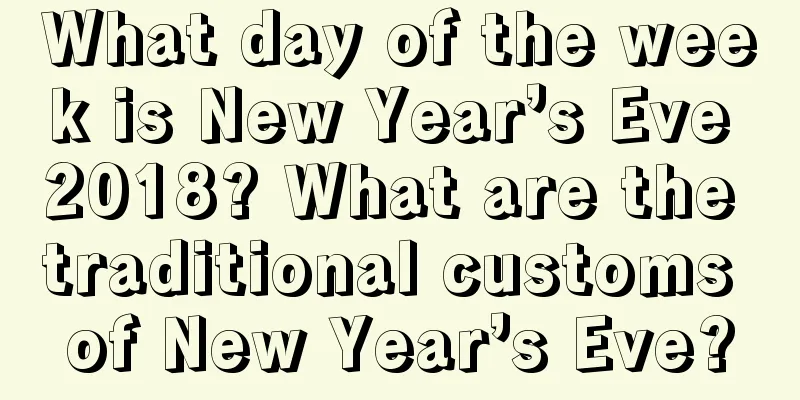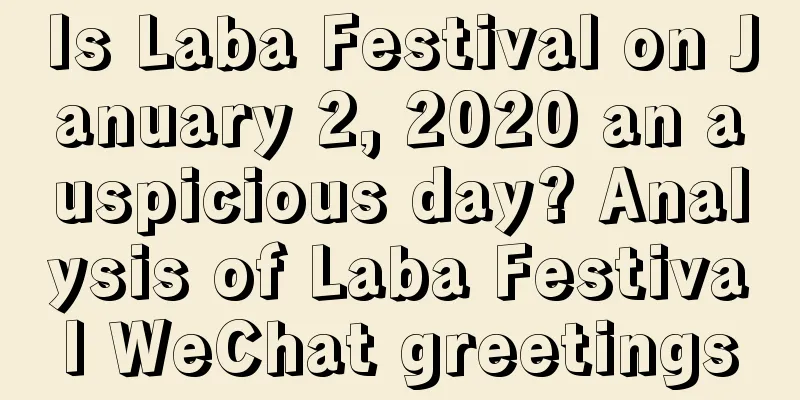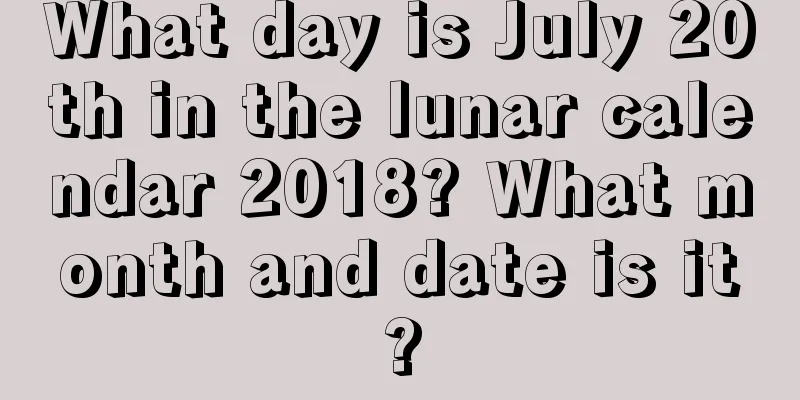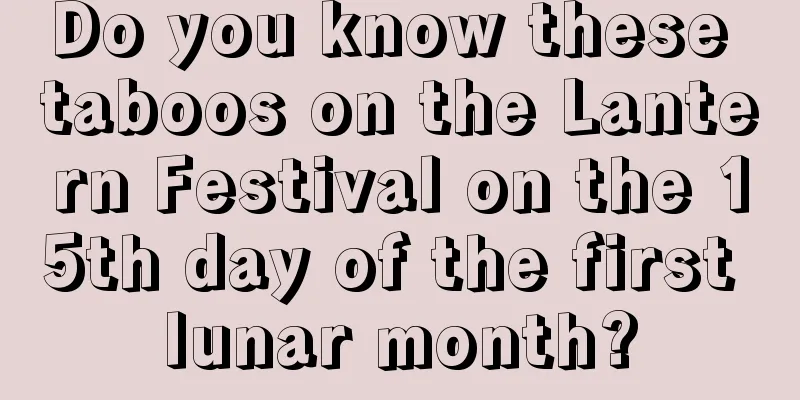What day of the week is New Year’s Eve 2018? What are the traditional customs of New Year’s Eve?

Introduction: China has been a traditional country since ancient times, and therefore has many traditional festivals and customs. So what day is New Year's Eve 2018? What are the traditional customs of New Year’s Eve? The Fortune Teller website has carefully prepared relevant topics for the 2018 Chinese New Year and New Year’s Eve. Everything you want to know is included. Come and have a look!What day of the week is New Year’s Eve 2018?Thursday, February 15, 2018 (the 30th day of the twelfth lunar month of the Dingyou Year (Year of the Rooster), 8 days away from the Lunar New Year's Eve of 2017)New Year's Eve is also known as New Year's Eve, New Year's Eve, New Year's Eve, and Suichu. It is the last night of the twelfth month of the lunar calendar every year. "Chu" means to remove; "xi" refers to night. New Year’s Eve is a festival for bidding farewell to the old and welcoming the new, starting a new year and bringing renewal to everything. Along with Qingming Festival, Zhongyuan Festival and Double Ninth Festival, it is China's traditional festival for ancestor worship, and is also a traditional cultural festival popular in countries in the Chinese character cultural circle. New Year's Eve is also called New Year's Eve because it usually falls on the 29th or 30th day of the twelfth lunar month. It is one of the most important traditional festivals in China. The people attach the most importance to it. Every household is busy cleaning the house to welcome their ancestors home to celebrate the New Year, and offer them rice cakes and three kinds of animals as sacrifices. The last day of the lunar year is called "Sui Chu" and the night of that day is called "Chu Xi". Since ancient times, there have been customs on New Year's Eve such as staying up all night, watching the year end, putting up door gods, spring couplets, New Year pictures, and hanging lanterns. These customs have been passed down to this day and are enduring. Influenced by Chinese culture, New Year's Eve is also a traditional festival in countries in the Chinese character cultural circle and Chinese and overseas Chinese around the world. What are the traditional customs of New Year’s Eve?1. Eating New Year's Eve Dinner <br /> The New Year's Eve dinner is also called the reunion dinner. According to the records of Zong Yan's "Jingchu Sui Shi Ji", the custom of eating New Year's Eve dinner has existed at least since the Southern and Northern Dynasties. Because it is winter, people in the north often set up a hot pot in the middle of the dining table, so it is also called "weilu".2. Do not draw water on New Year's Eve <br /> There is a taboo of "not drawing water" during the Chinese New Year. Families with wells must "seal the well" before dusk on New Year's Eve, put a wooden cover on the well, offer cakes and burn incense to worship, and then open the cover and reuse it three days later. 3. Ancestor worship on New Year’s Eve <br /> Ancestor worship is the first major event on New Year’s Eve. In many places in our country, on this day, people will set up sumptuous meals at home, light incense and candles, and the head of the family will lead their children and grandchildren to kowtow. In some rural areas in the north, people still burn paper money at home. In the evening of New Year's Eve, the whole family lights incense and candles, pours fine wine, and places dishes in front of the ancestral portraits, and holds a grand sacrificial ceremony to express the sentiment of "respecting the dead and remembering the ancestors." People start to enjoy their meal only after their ancestors have finished their New Year’s Eve dinner. 4. Give lucky money on New Year’s Eve <br /> The ancients were very particular about lucky money. The copper coins used should be large and new, and then strung into various shapes with red ropes. Some people wear hundreds of copper coins on their belts, meaning "long life"; others wear auspicious shapes such as carp, ruyi, dragon, etc., meaning "money dragon" or "surplus money" in the hope of bringing good luck. In addition to the elders giving children "lucky money", some areas also have the custom of giving "lucky fruit". On New Year’s Eve, the elders will put oranges, lychees and other fruits next to children’s pillows, with the meaning of “auspiciousness” to wish the children good luck in the coming year. With the development of the times, today's "lucky money" is more direct and pure. It is usually packed with red bills in exquisite red envelopes and then distributed to children to wish for a prosperous and good start. 5. New Year's Eve Stepping on the Year of the Year Activity <br /> On New Year's Eve, the Chinese people also hold a stepping on the year of the year activity, that is, sticking sesame stalks with gold ingots rolled with yellow paper in the yard, and putting them into a bundle, which is called a "treasure bowl". Then, the whole family crushes it with their feet, using the Chinese character for broken (broken) to rhyme with the Chinese character for year (old), and borrowing the auspicious meaning of sesame seeds blooming higher and higher, to wish the family prosperity and express their blessings and hopes for the new year. 6. Staying up all night on New Year's Eve <br /> Staying up all night on New Year's Eve is also a long-standing custom. As early as the Western Jin Dynasty, there was a clear record in the "Fengtu Ji": "Staying up all night to wait for the dawn is called staying up all night." Legend has it that staying up all night is to prevent the invasion of a unicorn, which is most afraid of fire, red and noise. Therefore, people wear red clothes, light red lanterns, paste red paper, set off fireworks and firecrackers, burn incense and pray, and stay up all night on New Year's Eve. This is how the custom of "staying up all night" came into being. The "Records of the Imperial Capital's Sui Shi Sheng" records: "Lighting silver candles, drinking pine wine, sitting until dawn, it is called Shou Sui, and it is a sign of longevity." In many places, New Year's Eve is also called "Auspicious Night". On this night, adults and children alike must say auspicious words and are not allowed to say unlucky words, dirty words or disrespectful words, otherwise they will have bad luck for the whole year. Therefore, joy, harmony and reunion are the biggest themes of New Year's Eve. 7. Sleep with the lights on on New Year’s Eve <br /> When you go to bed on New Year’s Eve, you cannot turn off the lights. You can only turn off the lights when the sun rises on the first day of the new year. Throughout the night of New Year’s Eve, the lights in the house are usually kept on, especially in the room where ancestors are worshipped. 8. Avoid breaking objects on New Year's Eve <br /> It is also a custom to avoid breaking objects on New Year's Eve. People believe that if you break bowls, plates, cups or dishes on this day, it means bad luck in the new year. Sometimes if cups or plates are accidentally broken on this day, the elders will quickly wrap them up in red paper and chant auspicious phrases such as “May you be safe every year” to remedy the situation. People believe that placing the fragments wrapped in red paper on the altar for a few days can avert possible disasters. Therefore, in order to have a good start on New Year's Eve, people will be careful with their words and actions in order to wish for an auspicious and prosperous year. 9. Post Spring Festival Couplets on New Year's Eve <br /> Spring Festival Couplets, also known as "door couplets", "spring stickers", "couplets", and "couplets", are a type of couplets and a unique literary form. This pair of the world's earliest Spring Festival couplets, "The three yangs begin to spread, the four seasons begin to open", is recorded on the Dunhuang manuscripts unearthed from the Mogao Grottoes. The couplet was written by Liu Qiuzi of the Tang Dynasty in the 11th year of Kaiyuan (723). The custom of pasting Spring Festival couplets during the Spring Festival began to become popular among the people in the Ming Dynasty, and the trend originated in Nanjing. Nowadays, people in the Jiangnan region pay attention to pasting Spring Festival couplets on the morning of New Year's Eve. 10. Pasting New Year Pictures on New Year's Eve <br /> New Year pictures, like Spring Festival couplets, originated from "door gods". With the rise of woodblock printing, the content of New Year pictures was no longer limited to door gods, but gradually the God of Wealth was invited to the home. As a result, some New Year picture workshops produced colorful New Year pictures such as "The Three Stars of Fortune, Longevity and Prosperity", "The Heavenly Official Grants Blessings", "Abundant Harvest", "Prosperous Livestock", and "Welcome the Spring and Receive Blessings" to meet people's beautiful wishes for festive prayers for the coming of a new year. 11. Pasting window flowers on New Year's Eve <br /> People also like to paste various paper-cuts on windows - window flowers. Window paper-cuts not only set off the festive atmosphere, but also combine decorative, aesthetic and practical functions. Paper-cutting is a very popular folk art in my country and has been loved by people for thousands of years. Because it is mostly pasted on windows, it is also called "window flowers". Window paper-cuts, with their unique method of generalization and exaggeration, vividly express auspicious events, good wishes, and decorate the festival with prosperity and splendor. 12. Pasting the word "Fu" on New Year's Eve <br /> Pasting the word "Fu" on Spring Festival is a long-standing custom among the Chinese people. Pasting the word "Fu" during the Spring Festival reflects people's yearning for a happy life and is also a wish for a better future. There is no uniform standard on how to paste the character "Fu". 13. You must be home by midnight on New Year's Eve <br /> After the reunion dinner is finished amidst laughter and joy, the family will sit around the TV to watch the Spring Festival Gala, or visit relatives to chat, but you must be home before midnight. Once it is midnight, the whole family will stay up at home. When the clock hands pass 12 o'clock, people will set off firecrackers that have been prepared in advance to celebrate the arrival of the New Year. 14. Setting off firecrackers on New Year's Eve <br /> There is a saying among Chinese people that "setting off firecrackers when the door is opened". When the new year comes, the first thing every household does when they open the door is to set off firecrackers, using the sound of firecrackers to get rid of the old and welcome the new. It has a very early origin and has a history of more than two thousand years. Setting off firecrackers can create a festive and lively atmosphere. It is a kind of entertainment activity during festivals and can bring joy and good luck to people. Summary: The above content is about [What day is New Year’s Eve 2018? What are the traditional customs of New Year’s Eve? 】Problem analysis, hope it can help everyone! |
>>: Is it possible to get engaged or married on the fourth day of the first lunar month in 2018?
Recommend
Is June 19th of the lunar calendar 2022 a day of underworld? Having a bad day?
The good and bad days of each lunar calendar day a...
Is the 14th day of the fourth month of the leap year a harvest day in the Grain in Ear solar term of 2020? Is it auspicious to sign the contract?
Grain in Ear is the ninth solar term in a year, an...
What are the things to pay attention to when traveling on New Year’s Day in 2021? Must code up
Traveling must be something that many people look ...
Is it a good idea to get engaged on October 17th of the lunar calendar in 2021? Can we get engaged?
The pros and cons of getting engaged at different ...
Is the Lantern Festival Chinese Valentine's Day? Why is the Lantern Festival called the Chinese Valentine's Day?
Introduction: The Lantern Festival is not only an ...
Is it a good date to pick up the car on March 24, 2019?
March is the month with the best spring weather. ...
What is missing from the five elements in August of the lunar calendar in 2019? What are the five elements of the eighth month in the lunar calendar?
Different months correspond to different earthly b...
Is April 15th a good day for offering sacrifices this year?
The arrival of each new month brings us many surpr...
What is Grain Rain? What is the meaning of Grain Rain?
Introduction: Grain Rain is the sixth solar term i...
Is the eleventh day of the twelfth lunar month in 2018 an auspicious day to burn incense and pray for blessings?
Introduction: Different days unfold in different w...
Analysis of the 13th day of the eighth lunar month in 2021, is it possible to get engaged?
There are certain rules and considerations for cho...
Are children born on August 29, 2021 in the lunar calendar good? What is their zodiac sign?
In mid-autumn August, sweet osmanthus flowers are ...
Query the position of the lucky god for the Dragon Raising its Head on February 2, 2022
The "dragon" in "Dragon Raising its...
What is the fate of those born in the year of the Pig during the Great Cold? OK?
The fate of people born in the Great Cold during t...
August 15th is the best time to be born on the Mid-Autumn Festival! Is a girl born on August 15th destined to be a queen?
Many people of the older generation have many supe...









